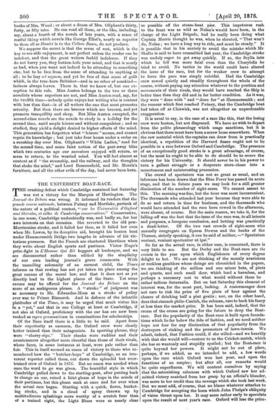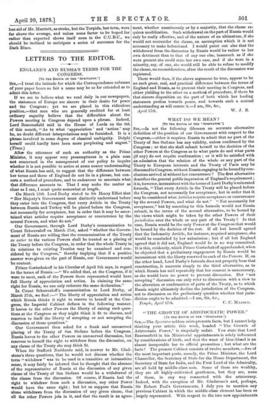THE UNIVERSITY BOAT-RACE.
THE crushing defeat which Cambridge sustained last Saturday was not a victory for the Marquis of Hartington. The Journal des Debate was wrong. It informed its readers that the grande course nationale, between Putney and Mortlake, partook of the nature of a political contest, "car lee Universites d'Oxford soul liberales, et celles de Cambridge conservatives." Conservative, in one sense, Cambridge undoubtedly was, and badly so, for her own interests on that occasion. She reverted to the old prm- Morrisonian stroke, and it failed her then, as it failed her even when Mr. Lawes, by its deceptive aid, brought his beaten boat under Hammersmith Bridge two lengths in advance of his vic- torious pursuers. But the French are chartered libertines when they write about English sports and pastimes. Victor Hugo's prize-fight in L'Homme Qui Rh t beggars all burlesque, and we are disconcerted rather than edified by the simplicity of our own leading journal's grave comments. With the unsmiling solemnity of an earnest child, the Times informs us that rowing has not yet taken its place among the great canons of the moral law, and that it does not as yet directly lead to the highest places of the State. Yet some excuse may be offered for the Journal des Debate on the score of an ambiguous phrase. A " stroke " of judgment was as necessary to Mr. Edwardes-Moss as a stroke of policy ever was to Prince Bismarck. And in defence of the infantile platitudes of the Times, it may be urged that much virtue lies in a "yet," and that in one College at least at Cambridge, if not also at Oxford, proficiency with the oar has ere now been ranked as supra grammaticam in examinations for scholarships.
Of the Race itself there is a little to be said. Apart from their superiority as oarsmen, the Oxford crew were clearly better trained than their antagonists. In sporting phrase, they were "cherry-ripe." Their cheeks were ruddier and their countenances altogether more cheerful than those of their rivals, whose faces, in some instances at least, were pale rather than fair. This in itself seemed an omen of victory to those who re- membered how the " butcher-boys " of Cambridge, as an irre- verent reporter called them, cut down the splendid but over- trained crew of Oxford in 1876. But no omen was needed when once the word to go was given. The beautiful style in which Cambridge pulled down to the starting-post, after putting back to change an oar, raised a faint gleam of hope in the minds of their partisans, but this gleam sank at once and for ever when the actual race began. Starting with a quick, fierce, bucket- ing stroke, and in a cloud of spray thrown up by multitudinous splashings more worthy of a scratch four than of a trained eight, the Light Blues were as nearly clear as possible off the steam-boat pier. This impetuous rush to the front was as wild as Nolan's would have been, in the charge of the Light Brigade, had he really been doing what Captain Morris thought he was, when he shouted, "That won't do, Nolan ; we have a long way to ride, and must be steady." It is possible that in his anxiety to avoid the mistake which Mr Shafto is said to have committed last year, the Cambridge stroke was unduly eager to get away quickly. If so, the Scylla into which he fell was more fatal even than the Charybdis he tried to avoid. No tactics in the world could have altered the issue of the race, but for the weaker crew to attempt to force the pace was simply suicidal. Had the Cambridge crew rowed quietly and steadily throughout the whole of the course, without paying any attention whatever to the position and movements of their rivals, they would have reached the Ship in better time than they did and in far better condition. As it was, they were "done with " and "done for" at Hammersmith ; and the rumour which first reached Putney, that the Cambridge boat had taken off at Chiswick, was not altogether an unpardonable exaggeration.
It is usual to say, in the case of a race like this, that the losing crew were beaten, but not disgraced. We have no wish to depart from the polite phraseology which usage sanctions, but it is obvious that there must have been a screw loose somewhere. When the raw material which the captains can draw from is practically identical, a repetition of the Harvard fiasco ought not to be possible in a race between Oxford and Cambridge. The presence of an exceptionally good stroke is a great advantage, of course, but the most he ought to be able to do should be to secure the victory for his University. It should never be in his power to turn a gallant struggle or a desperate stern-chase into a monotonous and uninteresting procession.
The crowd of spectators was not so great as usual, and an inference has been drawn that the Blue Fever has passed its acute stage, and that in future years we may look for a still greater diminution of the number of sight-seers. We cannot assent to this. The morning was fine, but the hour was most inconvenient. The thousands who attended last year because they were able to do so and return in time for business, and the thousands who would have attended had the race been rowed in the afternoon, were absent, of course. But the main reason, we take it, for the falling-off was the fact that the issue of the race was, to all intents and purposes, a foregone conclusion, and betting was practically a dead-letter. Of the two vast crowds of sight-seers who annually congregate on Epsom Downs and the banks of the Thames, strictly speaking, it can be said of neither,—" Spectatum veniunt, veniunt spectentur ut ipsi."
So far as the actual race, in either case, is concerned, there is very little to see. But the Derby and the Boat-race are the events in the year upon which Englishmen of every degree delight to bet. We are not thinking of the meanly avaricious or reckless gamblers whose doings are chronicled in the papers, we are thinking of the million and one minor bets, of pints and quarts, and such small deer, which lend a harmless, and perhaps a necessary zest to what would without them be rather tedious Saturnalia. But on last Saturday this element of interest was, for the most part, lacking. A costermonger does not care to risk the price of five pints of beer against the chance of drinking half a pint gratis ; nor, on the other hand, does that staunch philo-Cantab, the cabman, care to back his fancy at less than the market price. It has been said, indeed, that the cream of the cream are going for the future to drop the Boat- race. But the popularity of the Boat-race is built upon founda- tions which lie far below the tide of fashion, and we need neither hope nor fear for any diminution of that popularity from the destroyers of rinking and the promoters of lawn-tennis. We admit, indeed, that Fashion could, if she willed—and we heartily wish that she would will—restore to us the Cricket-match, which she has so wantonly and stupidly spoiled ; but the Boat-race is quite beyond her powers. It might not be out of place, perhaps, if we added, as we intended to add, a few words upon the race which Oxford won last year, and upon the functions of an umpire ; but after all, our remarks would be quite superfluous. We will content ourselves by saying that the astonishing calmness with which Oxford saw her ad- mitted victory snatched from her grasp by an official's blunder, was more to her credit than the revenge which she took last week. But we must add, of course, that no blame whatever attaches to Cambridge for accepting the boon which John Phelps's obliquity of vision thrust upon her. It may seem rather early to speculate upon the result of next year's race. Oxford will lose the price-
less aid of Mr. Marriott, as stroke, but the Torpids, last term, were far above the average, and unless some factor to be hoped for rather than expected shows itself soon in the C.U.B.C., we should be inclined to anticipate a series of successes for the Dark Blues.



































 Previous page
Previous page